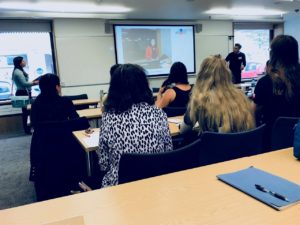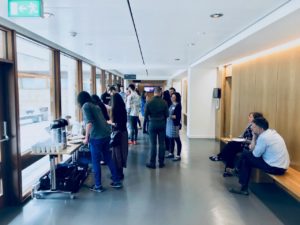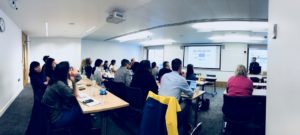Paul Leworthy reports on the Connecting Memories symposium held in Edinburgh in June 2018
The Connecting Memories symposium took place on Friday 1 June 2018 in the University of Edinburgh’s School of Languages, Literatures and Cultures. Funded by the IMLR, the symposium was part of the Connecting Memories Research Initiative’s ongoing efforts to develop links between scholars working on different aspects of memory and to establish a network of researchers working on memory in the UK, especially in Scotland and the North of England.
 The main aim of the symposium was to bring scholars from various institutions and disciplines together in order to create a dialogue between them about their different perspectives on memory. To that end, the event was composed of two round table panels and a keynote lecture. In theround table sessions, each of the speakers gave a 5-minute micro-presentation on some insight or methodological point relating to their own research. After the presentations, the chair took questions from the audience and initiated discussions between panellists, seeking to draw out the connections and disconnects between the presentations and the perspectives on memory voiced in them.
The main aim of the symposium was to bring scholars from various institutions and disciplines together in order to create a dialogue between them about their different perspectives on memory. To that end, the event was composed of two round table panels and a keynote lecture. In theround table sessions, each of the speakers gave a 5-minute micro-presentation on some insight or methodological point relating to their own research. After the presentations, the chair took questions from the audience and initiated discussions between panellists, seeking to draw out the connections and disconnects between the presentations and the perspectives on memory voiced in them.
 Delegates included scholars working in the fields of English literature, Chinese studies, French and Francophone studies, German studies, Spanish and Latin American studies as well as anthropology, history, heritage, sociology and political science. While most participants hailed from the humanities and social sciences, we also had delegates from disciplines including neuroscience, psychology and computer science. Attendees hailed from more than 15 different institutions across the UK. The Scottish universities of Edinburgh, Glasgow, Strathclyde, Stirling and St Andrews as well as Edinburgh Napier University and the University of the Highlands and Islands were all represented. Universities in the North of England were represented by attendees from Newcastle and York St John. Other speakers travelled from the universities of Cambridge, Cardiff and Brighton. Speakers included postgraduate students, ECRs and established academics.
Delegates included scholars working in the fields of English literature, Chinese studies, French and Francophone studies, German studies, Spanish and Latin American studies as well as anthropology, history, heritage, sociology and political science. While most participants hailed from the humanities and social sciences, we also had delegates from disciplines including neuroscience, psychology and computer science. Attendees hailed from more than 15 different institutions across the UK. The Scottish universities of Edinburgh, Glasgow, Strathclyde, Stirling and St Andrews as well as Edinburgh Napier University and the University of the Highlands and Islands were all represented. Universities in the North of England were represented by attendees from Newcastle and York St John. Other speakers travelled from the universities of Cambridge, Cardiff and Brighton. Speakers included postgraduate students, ECRs and established academics.
The symposium opened with a welcome speech by Paul Leworthy. In the round table sessions, we heard fascinating micro-presentations on a variety of subjects, all of which were admirably packed with information and insights despite the restrictive 5-minute time limit. Adeptly chaired by Dr Claire Boyle and Dr Simon Cooke (both University of Edinburgh) and propelled by incisive audience questions, the discussion sessions traced some of the connections and contradictions that obtain between different approaches to studying memory.
The role of spatial, social and cultural schemata was a key node around which contributions clustered, with interventions from scientists, social scientists and cultural critics each casting the others’ into sharper relief. The cultural framing of the past was considered in terms of narratives, nations and – often at the interface of the two – translations. Cautionary, critical and more optimistic positions were all defended as different forms of external memory resources were discussed. Positing memory as a present performance of the past, questions were asked on the one hand about the socio-political opportunities memory offers and on the other about the responsibilities it entails.
The day was rounded off by a captivating keynote lecture by Professor Andrew Hoskins (University of Glasgow) in which he drew on his research in digital memory studies to argue for a recalibration of the study of memory such that it affords adequate status to forgetting. The three main sessions were interspersed with opportunities for delegates to pursue conversations and enquiries sparked in the discussion sessions. Connections continued to be made in lively discussions during the drinks reception after the symposium.
Participants praised the format of the symposium and the breadth of the research perspectives it brought together. Delegates described how the event encouraged unexpected conversations and provided plenty of time and space for those talks to take place. The exposure the event offered to aspects of memory that individuals hadn’t encountered in the course of their own research was equally popular.
We are grateful to the University of Edinburgh School of Languages, Literatures and Cultures and especially to the Institute for Modern Languages Research for their generous support with this event.
***
Connecting Memories is a collaborative interdisciplinary research initiative opening up a space for previously unconnected scholars working on memory to interact, to share their perspectives and reflections on what memory means in the context of their research.
The Connecting Memories initiative is led by co-founders Paul Armstrong Leworthy and Bárbara Fernández Melleda. It is based in the School of Languages, Literatures and Cultures at the University of Edinburgh.
e: info@connectingmemories.org
f: https://www.facebook.com/connectingmemories
w: http://www.connectingmemories.org/
Paul Leworthy, University of Edinburgh

